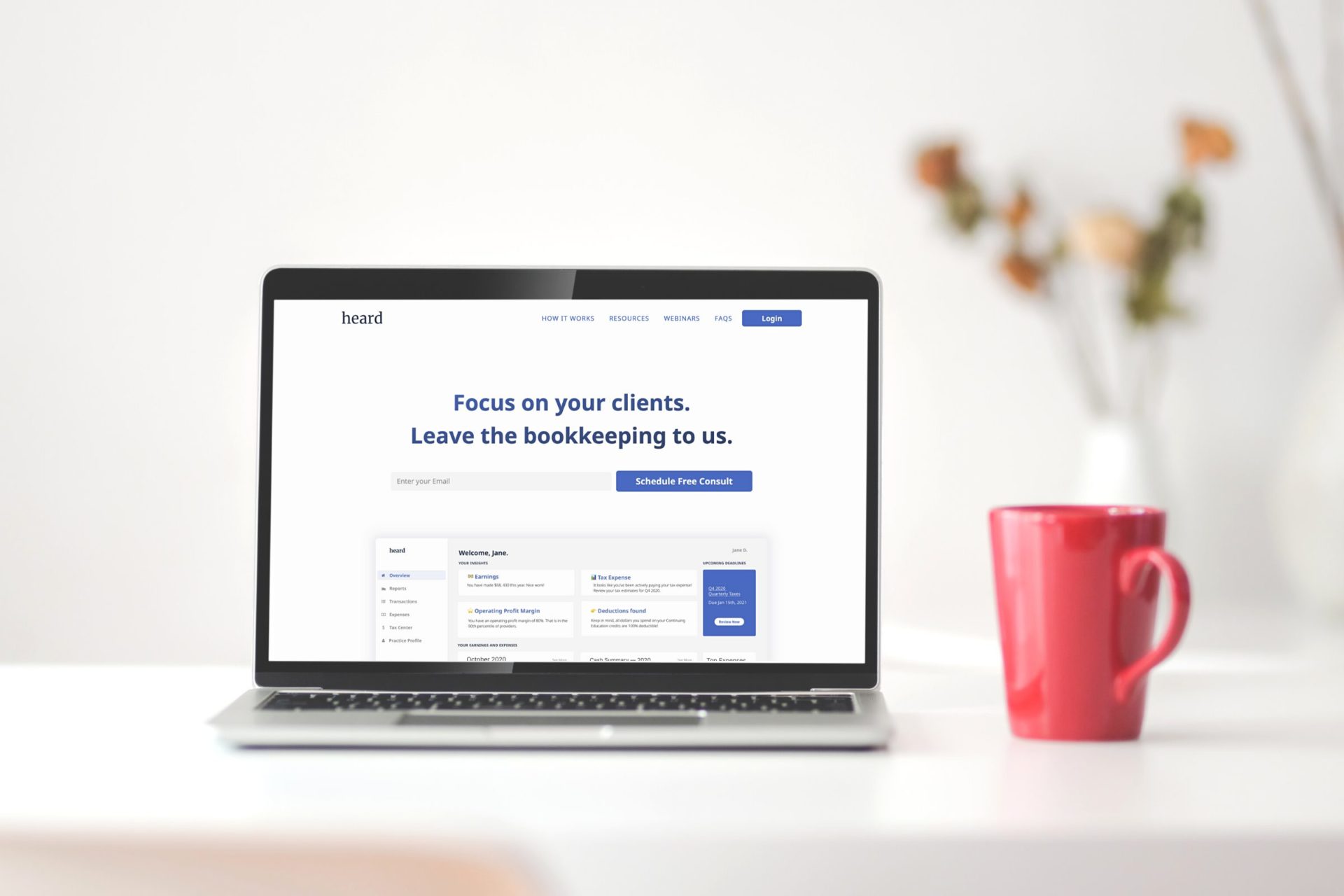I get asked SO many questions about private practice accounting:
- How do I keep track of my tax-deductible expenses as a therapist?
- How do I cut myself a paycheck every month?
- What accounting software should I use?
- How do I file taxes for private practice?
These are all super great questions.
And it’s no wonder we don’t know the answers to these questions, because no one ever taught us!
Not to worry! By the end of this post, you’ll have a sense of what route fits you best for your private practice accounting needs, as well as how you can prepare for tax season.
You’ll also want to keep an eye out at the end of this post for a complete checklist of everything you need to gather in order to file your taxes. It’s free!

my experience with private practice accounting
Full disclosure: since I started my private practice in 2012 up til the time I’m writing this post, I’ve 100% DIYed my private practice accounting.
Or more accurately, my husband DIYs 90% of it. I just keep a monthly tally of my revenue and expenses in an excel doc and cut myself a paycheck based on the equations he built into it for me. Every January, I hand the document over to him and he takes care of my taxes.
I realize that’s a pretty sweet deal. Thanks hubby!
But let me be clear about something: if I didn’t have a finance-savvy hubby, I would absolutely avoid DIYing my private practice accounting.
Why it’s a bad idea to DIY your private practice accounting
Unless you are a rare breed of therapist who is also an accountant, or you have an accountant in the family who is generously willing to do your finances for you, it’s probably not a great idea to do your own private practice accounting. Here are a few reasons why I think you should avoid this:
1. You might miss out on great tax deductions for your practice
As a small business owner, most of your business-related expenses are tax-deductible. Which means, rather than pay taxes on your private practice revenue, you first subtract a majority of your expenses and pay your taxes from that amount of money instead.
In other words, if you do your accounting properly, you wind up saving money.
SO many therapists are not aware of this. You might be paying money to the IRS that you don’t even owe them!
You can check out my article on tax write-offs in private practice if you’d like to learn more about the land of tax deductions.
2. You might not know you’re reporting something incorrectly – until you get audited by the IRS
The problem with DIYing your accounting is you might not even realize that you’re reporting something incorrectly or missing something important on your taxes.
That is, until you get audited by the IRS.
I’ve crossed my fingers and toes for you that you don’t ever get audited by the IRS. But if you ever do, you’ll want to feel rest assured that all your reporting is correct and that they won’t find anything fishy going on with your accounting.
3. It frees up your time
In general, the amount of time it takes for someone to DIY their accounting is many times greater than it takes for a professional to do the same thing (and do it better).
Why spend precious hours of your time learning about what deductions and taxes you need to account for when you could hand it over to someone who already knows what they’re doing and instead, spend your time doing what you love?
private practice accounting options
Even with everything I just said, I think the reason why a lot of therapists opt to do their own accounting and taxes is because they’re not sure what other options are available.
And if you’re like me, when you’re not sure what something is and you see a price tag on it, you run away.
It’s like when I take my car in for an oil change and the mechanic tells me that I also need a new spark plug. Oh and that’ll be $200 please.
I don’t know what a spark plug does, so why would I pay $200 to replace it?
But as it turns out, a quick Google search tells me that if I don’t replace a broken spark plug, eventually my engine could stop running. Which is kind of important.
So yes, $200 sounds more than worth the price to keep my car from totally dying. And thank you for fixing it for me!
I don’t know how I wandered into the rabbit hole of spark plugs in my post about private practice accounting. But you get the idea. Knowledge is power, and cost is relative to the benefit of a service. So let’s break down some of your accounting options in private practice:
Accounting and tax software
This is a notch above the DIY route. Accounting software can help with keeping track of your income, expenses, and payroll. And tax software can help you with tax preparation and filing.
Some examples of accounting software include Quickbooks for bookkeeping and TurboTax for tax preparation.
A huge pro of accounting software is it tends to be far more affordable than some of the other options. A huge con is that you often don’t get much individualized support (if at all), and it’s still pretty easy to make a lot of the same mistakes folks make when DIYing all of their accounting.
Still, this route has a little more support than simply doing the whole thing yourself, and is a financially accessible option for most therapists in private practice.
Accounting professional(s)
A lot of folks might not realize that there are an array of accounting professionals that can serve you based on your specific needs. I won’t do a deep dive into each of these professional services here, but I’ve made each profession on the list clickable in case you want to learn more and decide if one or more of these professionals might best serve you:
- Bookkeeper: keeps track of and maintains your day-to-day business finances.
- Tax Advisor: strategizes for how you can minimize your tax obligations (while following the law).
- Tax Preparer: completes and files your business’ tax forms.
- Accountant or CPA: takes charge of your account, ensures all reports are accurate and is qualified to do the work of a tax advisor and tax preparer as well.
As you can see, there are lots of accounting tasks you can hire a professional for!
A huge pro of hiring an accounting professional is you can be rest assured that your financials are all fully in order knowing that someone who knows what they’re doing has an eye on every aspect of your financials. A con is that this level of personalization makes this option pretty expensive. You are paying a professional for their direct time, after all!
Depending on your practice needs, you might benefit from hiring one or more professionals to help you with your private practice accounting, while for some folks the cost might be out of reach or simply not make sense financially.
Accounting service platforms
There are some platforms that offer a sort of hybrid experience of the two above accounting options: bookkeeping software that automatically keeps track of your financials for you, with a team of real human accountants evaluating your finances and consulting with you for your accounting needs.
The big win of this option is you get to have the pros of both the affordability of automated software and the professional work of an accountant directly consulting with you for your financial needs.
Because of this, this option is likely a great fit for many therapists in private practice.
Many of the accounting software options available do offer support with a dedicated accounting team when you upgrade to a higher priced plan, but they can come with mixed reviews, and they likely don’t have a specialized focus on private practice owners.
That’s why I recommend Heard Bookkeeping and Tax service platform. Heard is built specifically with therapists in mind and offers personalized bookkeeping and tax services (with real humans!).

My experience with Heard Bookkeeping and Tax
After all my years of DIYing my private practice accounting, this year I tried out Heard. I expected for the price that I would get an expense and revenue report to help me keep track of my financials, but I got so much more than that!
The team at Heard clearly cared about helping therapists understand what a financially healthy business looks like and empowering them to reach those goals.
They even offer monthly check-ins with an accountant, and the option to prepare your taxes for you as well, which was way beyond what I expected!
If you want to learn whether Heard might be a good fit for your private practice accounting needs, you can learn more here: Heard Bookkeeping and Tax Platform.
(I receive a commission from Heard. But I only recommend products I’ve tried myself and trust)
how to make sure your practice is ready for tax season
And one last superfun item to round off this post! The team at Heard was kind enough to offer a free checklist for you with a complete list of everything you need to gather in order to prepare your taxes.
They took the guesswork out of it for you so you can just run through the checklist and gather each of these items so you’re ready to prepare your tax return. Make sure you select the checklist that applies to your business:
Private Practice Tax Checklist for S-Corporations
Private Practice Tax Checklist for Sole Proprietors
Thanks to Heard for offering this valuable information for free!
Whether this is your first year in practice or if you’ve been in private practice for years, I hope you found this article helpful as you sort out what avenues are the best fit for your private practice accounting needs.
And until next time, from one therapist to another: I wish you well!
-Marie
Leave A Reply